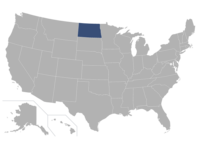North Dakota sues federal agency over methane regulation

North Dakota and three other states filed suit in federal court this week against the Bureau of Land Management over a new methane regulation the states say will hamper oil and gas production.
The Bureau of Land Management in a March 27 announcement said the rule seeks to rein in pollution caused by oil and gas production on federal and tribal land, and will require producers to pay royalties to public and tribal mineral owners for wasted gas.
Oil field operators routinely dispose of unwanted natural gas — predominantly methane — produced through the oil extraction process. Flaring refers to the practice of burning this gas, while venting is when operators release it into the air. It can also be lost unintentionally through leaks.
The BLM’s new rule, expected to take effect in June, will require producers to take additional steps to avoid wasting natural gas — like reducing venting and flaring, and doing more to detect and repair gas leaks.
Governor urges lawmakers to budget for court battles over federal regulations
The regulations also reduce the circumstances under which producers can flare gas without having to pay royalties to the federal government and tribal mineral owners.
“This final rule modernizes regulations that are more than 40 years old and will hold oil and gas companies accountable by requiring measures to avoid wasteful practices and find and fix leaks, while ensuring that American taxpayers and Tribal mineral owners are fairly compensated through royalty payments,” the BLM said in the announcement.
The BLM claims the new rule will bring in more than $50 million in royalties to tribes and the federal government annually.
North Dakota, along with Montana, Wyoming and Texas, are asking the court to strike down the rule as unlawful, claiming it would overburden oil and gas producers and that the BLM does not have the power to regulate air pollution. That authority was given to the Environmental Protection Agency under the Clean Air Act of 1970, the states argued in a complaint filed Wednesday in U.S. District Court in North Dakota.
If the regulations are allowed to take effect, energy production in the four states will decrease and their residents will lose out on crucial energy tax revenue, the complaint claims. North Dakota estimated that the rule would cost $38 million per year in state revenue from reduced royalties and oil and gas taxes.
The states allege that the BLM is attempting to resurrect a previous waste management rule that was struck down by a federal court in 2020.
Climate plan for energy-rich North Dakota ignores fossil fuels. Here’s why.
The lawsuit challenging that rule was led by Wyoming, with North Dakota, Montana and Texas also joining.
“Other than being less careless with its language this time, very little has been done to change the rule since the last time it was vacated, and none of the key legal infirmities have been fixed,” the states argue in the Wednesday filing.
The states also say the BLM is wrongfully attempting to regulate oil and gas that is owned by states or the private sector.
Mark Fox, chair of the Mandan, Hidatsa and Arikara Nation, through a spokesperson declined to comment on the lawsuit Friday, stating he had not yet read the complaint. The Fort Berthold reservation has more than 2,600 active oil and gas wells, with the potential for another 2,000 wells to be drilled in the future, according to the state state Oil and Gas Division.
North Dakota produced an average of nearly 3.4 billion cubic feet of natural gas per day in February, according to preliminary figures from the state.
Ninety-five percent of that gas was captured, exceeding the North Dakota Industrial Commission’s target of 91%. The gas capture percentage on the Fort Berthold reservation also was 95%.
Operators flared, or burned off, 5% of the natural gas produced statewide in February, or more than 183 million cubic feet per day, preliminary figures show.








